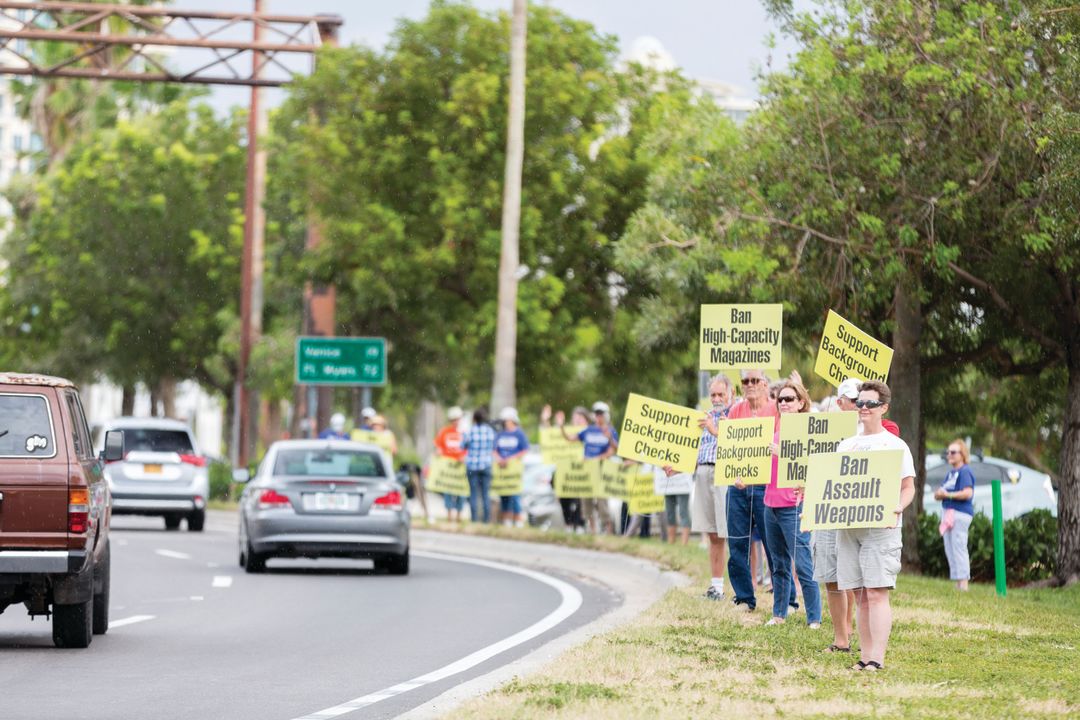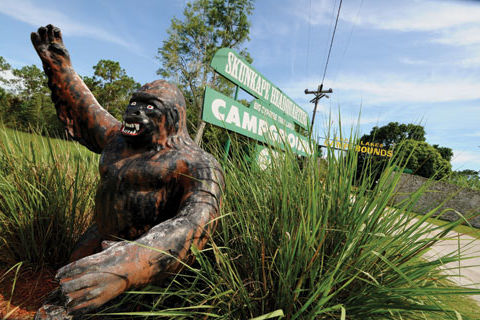Florida is Tough Terrain for Gun Control—But Local Activists Keep Trying

Gun regulation advocates along the bayfront.
Image: Karen Arango
On a gusty overcast afternoon, four days after the mass shooting in Las Vegas, Carol Rescigno arrived at the Sarasota bayfront as she has most Thursdays for the past four years. She wore a blue T-shirt with the words “Brady Campaign to Prevent Gun Violence,” to which she had affixed a large button that said “#FactsMatter.”
For the next hour, Rescigno and 30 other Brady campaign supporters stood along U.S. 41 in the shadow of the Unconditional Surrender statue, holding signs that read “Ban Assault Weapons,” “Support Background Checks” and “Ban High-Caliber Magazines.” Some drivers seemed not to notice the line of demonstrators. A couple made obscene gestures. But many waved or honked their support.
“We’re out here every Thursday from October through May,” Rescigno was saying. “There are people who say we’re wasting our time, that if nothing happened after Sandy Hook, it’s is never going to happen. But I cannot accept that. You’ve got to try. If we don’t, how can we ever stop these massacres?”
Florida is tough terrain to take a stand on gun control. The Sarasota chapter, of which Rescigno is the president, is the Brady Campaign’s only active one in the state. By contrast, California has 28 chapters and even Texas has three. Sarasota’s state senator, Greg Steube, a Republican who chairs the Senate Judiciary Committee, has sponsored a slew of legislation expanding gun rights, including proposing allowing concealed weapons in schools and airline terminals.
“At least Steube agreed to meet with us,” Rescigno says. “He would not support anything we’re advocating, but he sat across from us. [Congressman] Vern Buchanan has never agreed to meet with us.”
For most of her life, Rescigno’s job as a journalist demanded that she keep her political beliefs to herself. In 2008, she retired as deputy foreign editor at the Long Island newspaper Newsday. She began teaching a journalism ethics class at Stony Brook University in New York, using the Columbine massacre as a case study for her students. Hours of watching video and reading stories from the 1999 mass shooting at the Colorado high school so affected her that when she moved to Sarasota with her husband Rich, Carol joined the Brady Chapter. Not long after that, Carol’s commitment to gun law reform grew personal when her son, Tim, met his future wife, Cristen, whose cousin was one of the 20 children killed at Sandy Hook Elementary School in 2012 in Newtown, Connecticut.
The Brady Campaign dates to 1974, when a graduate student from Chicago named Mark Borinsky was robbed and threatened at gunpoint. He moved to Washington, D.C., and formed the National Council to Control Handguns. The name was changed in 2001 to honor James Brady, President Ronald Reagan’s press secretary, who was shot and paralyzed by John Hinckley Jr., and Brady’s wife, Sarah, who became a leading advocate to prevent gun deaths.
None of the Brady Campaign’s three chief goals involves outlawing firearms. Instead, the campaign seeks background checks on all gun sales, cracking down on “bad apple” gun dealers and taking “a public health approach” to reduce unlocked guns in homes where children are present. It says that doing all those things would cut the number of gun deaths in the United States in half by 2025.
“We’re not trying to control guns, we’re trying to regulate them in a safe way,” says David Evans, a retired Episcopalian priest who started the Sarasota Brady chapter six years ago. “But it’s been a hard fight. Every time we have one of the mass killings, everyone is excited and we get more people out at the bayfront. Then people just seem to forget about it.”
A couple weeks after attending the bayfront rally, I stop by The Bullet Hole gun shop on Orange Avenue, where I find myself in line behind a man in his 60s with a mohawk haircut dyed jet black, who tells the clerk, “I’m looking for .38 specials.” When I get to the counter, I introduce myself to owner Fran Misantone, who replies, “Can’t you see we’re busy?” Then, he adds in a kind tone, pointing to a corner of the room, “Come back this afternoon and we’ll sit on the sofas over there and talk.”
That afternoon, I sit across from Misantone on facing couches. Fox News blares on the TV nearby. On the wall behind Misantone hang the hide and head of a lion. I ask Misantone if he had fired the shots that felled the animal.
“No, that was a circus lion named Big Boy that was put down,” he replies. “I quit hunting over 40 years ago. I don’t like killing.”
Misantone says he didn’t know much about the Brady Campaign, but that he supports background checks and believes all gun owners should keep their firearms locked in a safe. I noted that stores like The Bullet Hole are required to do background checks, but that private sellers, including those at gun shows, are not. “I’m not going to criticize gun shows,” Misantone says. “The real problem is the background checks are so screwed up. You’ve got bad kids, kids who are in trouble in fifth grade, having their records expunged when they are young, so they don’t show up when buying a gun.” Another flaw is that court systems take too long to update criminal records, he says. “They could update the background checks in a day, but sometimes it takes months,” he says.
I ask Misantone about another of the Brady chapter’s goals, keeping guns out of the hands of children. Misantone says in Florida gun owners can be prosecuted for allowing a minor easy access to a firearm.
“But that law is never prosecuted,” he says. “Let’s enforce the laws we have on the books before we make new ones.”
Warming to the interview, Misantone says the right to bear arms is a fundamental freedom. The “real reason,” he says, that Japan never invaded the U.S. mainland in World War II was because “they knew every American had a gun.” Misantone pauses, then declares he knows a sure way to reduce gun violence: Anyone who uses a gun in a crime “should be put against a wall and shot. That would send the message.”
I suggest that does not sound like a plausible solution. “It’s a lot better than paying $30,000 a year to keep them in prison,” he replies.
“Oh, boy, that’s what we need: violent retribution,” Evans says, when I relay Misantone’s idea. “I think we can do a lot better than that to save lives.”
Evans and Rescigno say that polls show strong support for gun safety reforms. A survey last year by CBS News and The New York Times, for example, found that 92 percent of Americans favor background checks for all gun sales.
“I see that when we’re waving our signs,” Rescigno says. “Out of a hundred cars that go by, 30 of the drivers are on their phones or don’t see us. Another seven to 10 may make a negative gesture. But the rest are honking and waving their support. We just have to channel that into action.”
The Brady Chapter to Prevent Gun Violence rallies every Thursday from 4 to 5 p.m. near the Unconditional Surrender statue along the bayfront.



